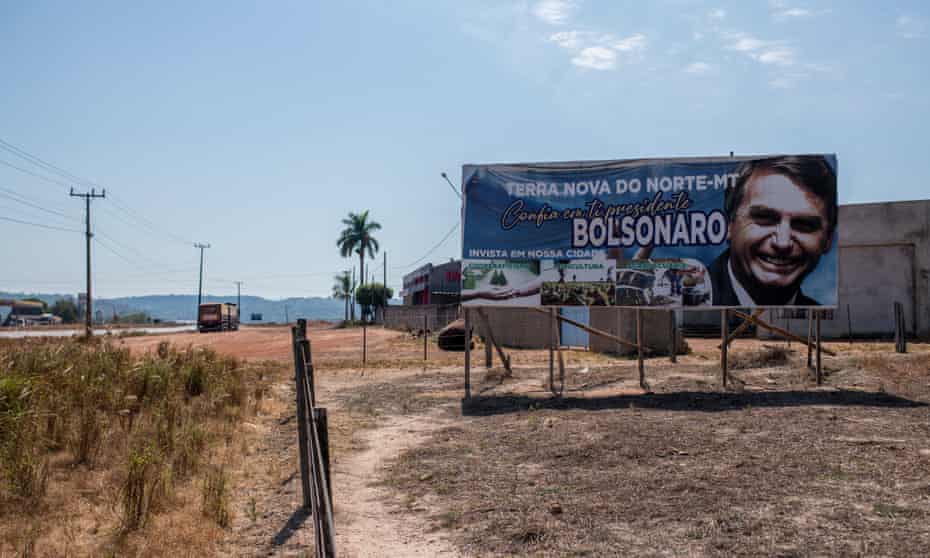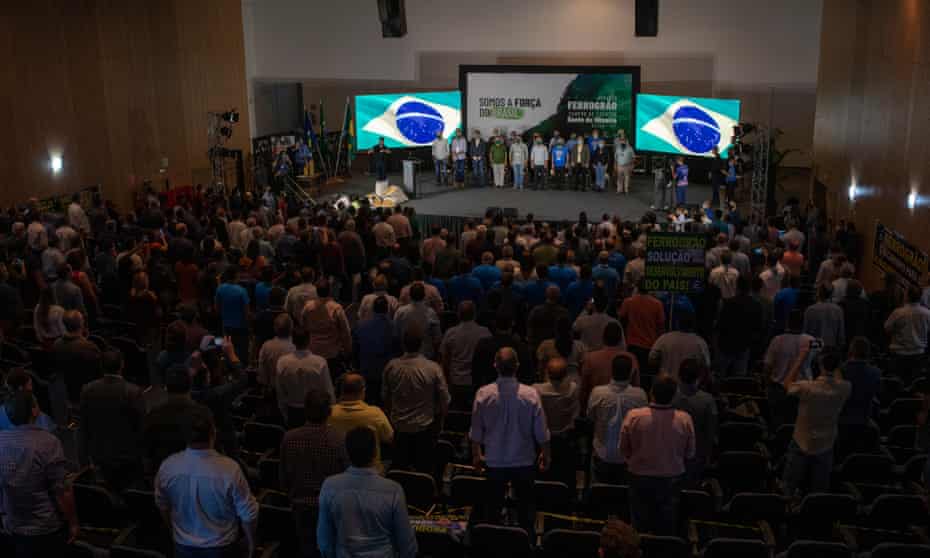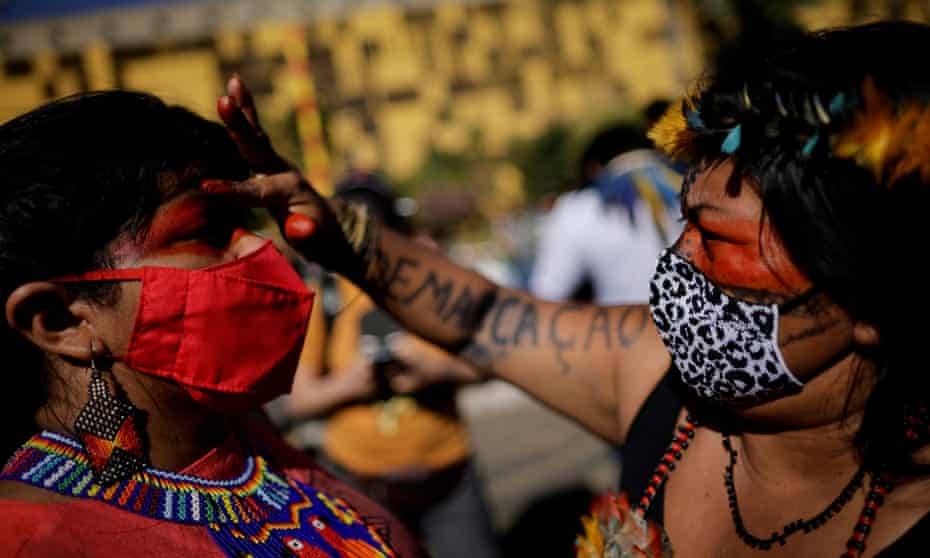Fast track to disaster? Brazil’s Grain Train plan raises fears for Amazon

Bolsonaro’s government plans to build a 1,00km railway to export soya beans despite warnings of a ‘catastrophe’ for indigenous people and the environment
The Final Countdown blared from speakers and the crowd broke into applause as one of Jair Bolsonaro’s top lieutenants strode into the Amazon auditorium with glad tidings of a railroad to the future.
“The ‘Grain Train’ is going to happen,” Brazil’s infrastructure minister, Tarcisio de Freitas, told the hundreds of mostly male spectators who had flocked there in a caravan of high-end SUVs.
To the assembled members of Brazil’s agribusiness elite – among them several of the president’s most militant supporters – the “Ferrograo” (Grain Train) is a long-held dream: an almost 1,000km railway that, if built, will link Brazil’s soya-growing heartlands with the northern ports that send their beans east to Asia.
“It’s fabulous. The region will explode,” celebrated Adenir da Silva, one of the excitable locals who had come to welcome Bolsonaro’s minister to Sinop, the agricultural boomtown where the planned railroad would begin. Behind him a crane had hoisted an enormous Brazil flag into the morning sky in honour of the VIP visitor.
To opponents, however, the R$25.2bn ($4.6bn/GBP3.4bn) project is a nightmare: yet another nail in the coffin of the world’s largest tropical rainforest and the indigenous populations who lived there long before Brazil was “discovered” by the Portuguese in 1500.
Alessandra Korap, a representative of the Munduruku people, whose ancestral lands lie near the railway’s final stop in Miritituba, on the banks of the River Tapajos, called the Grain Train part of a wider assault on the Amazon and its original dwellers that has accelerated since Bolsonaro’s 2018 election.
“The only people standing in the way of this program of death are the indigenous,” Korap said as she marched through a protest camp in Brasilia last month having traveled to the capital to denounce a historic attack on native lands.
The assembly in Brasilia was organised by the Articulation of Indigenous Peoples of Brazil (APIB) coalition, which claims the Grain Train will cause an “environmental and humanitarian catastrophe” comparable to the construction of the Trans-Amazonian highway in the 1970s and the more recent Belo Monte megadam.
In July APIB invited campaigners from the leftist Progressive International (PI) to Brazil to oppose the “irreversible devastation” it alleged the railway would inflict. “The Amazon is under attack,” PI member Jeremy Corbyn tweeted, denouncing Bolsonaro’s dangerous “extractive agenda”.
But such foreign criticism gets short shrift in the intensely nationalistic backlands of the Brazilian Amazon.

Mauro Mendes, the rightwing governor of Mato Grosso state, where the railroad would start, derided the meddlesome leftists supposedly trying to torpedo the plan, including the US senator Bernie Sanders, the Mexican actor Gael Garcia Bernal and Greece’s former finance minister Yanis Varoufakis.
“Are we really going to lose to these guys? No! We’ll win this war – and we’ll fight with all the weapons necessary,” Mendes told the summit in Sinop, remembering how Native American communities were devastated by the construction of the US transcontinental railroad in the 19th century.
“We will build the Ferrograo without killing a single Indian!” Mendes proclaimed to loud applause.
Elbio Volkweis, the Bolsonarista head of Sinop’s town hall, also spurned foreign critics, calling them “uninformed ecologists” spouting “nonsense” and “shit”.
“Do me a favour!” scoffed Volkweis, whose region’s farmers have helped turn Brazil into the world’s number one soya bean producer. “We’re the bread-basket of the world … If we don’t produce, the world dies of hunger.”
Bolsonaro’s infrastructure minister, who is widely seen as the railroad’s key champion, was more measured. Speaking to the Guardian in Sinop, he called the Grain Train a key piece of infrastructure for a country that now produces more than a third of the world’s soya beans, with 70% of exports going to China.
Freitas claimed no indigenous territories would be penetrated and environmental damage would be minimal since the line would run alongside the BR-163, a major highway that runs northwards through Sinop to the port city of Santarem.
By slashing the number of commodity-carrying lorries on that traffic-clogged artery, the Grain Train – for which the government hopes to launch a bidding process in the coming months – would also cut carbon emissions. “This will be a green railroad,” Freitas said, claiming critics were “filled with prejudice” against Bolsonaro’s administration. “Nothing about this is an environmental or humanitarian catastrophe.”

Profound wariness over the initiative is unsurprising given the plight of Brazil’s environment and indigenous peoples under a president who has undermined the agencies tasked with protecting both.
“Before [Bolsonaro] we used to try to denounce all of the attacks we suffered to the government. But who are we going to denounce these things to now, when it’s the government itself inciting and encouraging the violence and legitimizing these attacks?” asked Sonia Guajajara, one of Brazil’s best-known indigenous leaders.
Doto Takak-ire, a leader of the Kayapo people whose lands lie east of the planned railroad, said his community was still debating its stance. But he voiced skepticism that a president so hostile to indigenous rights might build a railroad that put their interests first. “This guy’s mad,” Takak-ire said of Bolsonaro.
In recent weeks Grain Train advocates have launched a charm offensive, designed partly to convince indigenous elders not to obstruct construction. In late August politicians and government officials gathered in Novo Progresso, a town on the train’s planned route, to trumpet the bonanza they claimed it would bring.
For two days delegates raved about the railway’s supposed benefits to Amazon towns and indigenous villages alike.
“The American Indians … invest in the stock exchange. They buy shares and they sell shares. They have hotels and casinos,” Wanderley Paulo, a councillor from Sorriso, a farming hub near Sinop, told Kayapo emissaries who wore headdresses fashioned from the feathers of parrots and macaws.
Paulo urged his indigenous interlocutors to embrace the project and open their lands to tourism. “Your culture is beautiful. The whole world wants to get to know your culture. They pay in dollars!” Paulo gushed as Kayapo representatives looked on in apparent bemusement and suspicion.

Some indigenous participants seemed seduced by such visions. Adriano Amorim, who represents a Kayapo village in the Bau indigenous territory and supports Bolsonaro, predicted the railway would bring jobs. Opposing it was pointless.
“It’s like having an alcoholic in the family … It’s better to just accept it,” said Amorim, who claimed the Kayapo would only face further discrimination in the region’s largely white settler towns if they resisted.
Others, however, voiced nervousness over the railway, whose construction was temporarily suspended earlier this year by a supreme court judge because of fears of deforestation, which has soared under Bolsonaro.
“We don’t accept it because nobody has said anything to us … No white man has come to our village to consult us,” said Bepte Kayapo, another envoy to the meeting whose group represents villages in the Bau and Menkragnoti territories.
Takak-ire questioned government claims Kayapo lands would be unaffected and worried the train would turbocharge agribusiness’s Amazonian takeover, with dire environmental consequences.
Train or no train, Takak-ire was clear-eyed about the future of a region his ancestors have inhabited since ancient times. “Soya beans, soya beans,” he sighed. “Just soya beans.”
